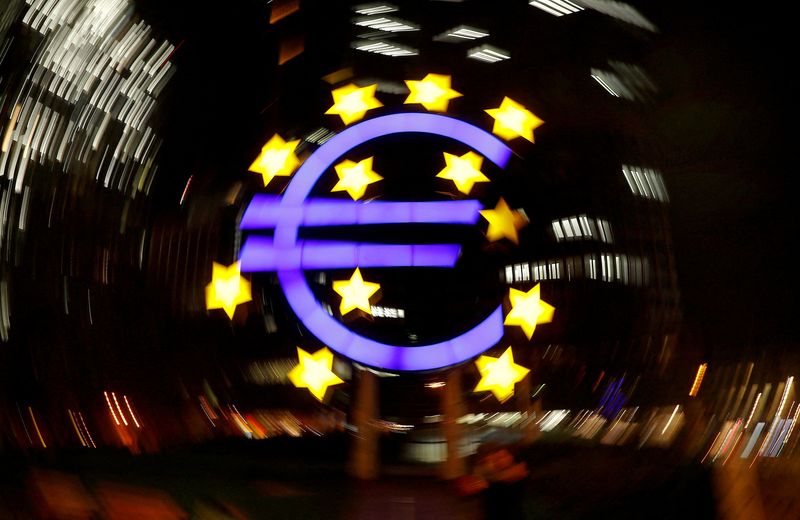By Stefano Rebaudo
MILAN (Reuters) -Surging inflation expectations triggered by possible sanctions on Russian oil drove euro zone real government bond yields to fresh record lows on Monday, amid rising fears of a stagflationary shock for the European economy.
Brent crude prices soared to their highest levels since 2008 after the United States and European allies weighed a Russian oil import ban and delays in the potential return of Iranian crude to global markets.
"Markets are pricing in risks of surging inflation, triggered by energy prices, coupled with an adverse impact on economic growth; they basically see stagflation risks," said Annalisa Piazza, fixed income research analyst at MFS Investment Management.
Germany's 10-year and 30-year inflation-linked government bond yields fell as much as about 16 basis points (bps), hitting new record lows of -2.531% and -2.407%, while inflation expectations surged. They were down around 9 and 10 bps respectively by 1602 GMT.
Germany's 10-year breakeven inflation rate rose to its highest since April 2011 at 2.299%.
A key market gauge of long-term euro zone inflation expectations rose to its highest level since January 2014 at 2.309%.
Meanwhile, the German 10-year nominal yield staged a rebound after falling sharply last week, when it recorded its biggest fall since November 2011 as markets scaled back bets on monetary tightening on concerns about the war in Ukraine.
It was up 8 bps at -0.020%, helped by a bounce in U.S. Treasuries. U.S. 10-year Treasury yield rose 2 bps to 1.758%.
Analysts still have mixed views about how the central bank will respond to the likely economic impact of the conflict.
"The 10 March ECB meeting likely reads hawkish, especially on (the) Asset Purchase Programme (APP), for a market that has been pushing back against normalization," Citi analysts said in a research note.
"However, explicit delays or new easing seem unlikely amid further inflation surprises," they added.
The three-month Euribor interbank borrowing rate rose to its highest since September 2020 at -0.498%, in a sign of rising funding costs.
"We expect (ECB President Christine) Lagarde not to make any commitment at the ECB's policy meeting," MFS' Piazza added. "We just see a possible rise in volatility if she doesn't rule out a rate rise by year-end during the press conference."
Piazza argued that "yields in the short-dated part of the German curve are currently pricing very limited chances of rate hikes by year-end."
Germany's 2-year inflation-linked bond yield fell 46 bps to -5.453%, after hitting an all-time low at -5.672%.
Deutsche Bank (DE:DBKGn) economists "expect the Ukraine crisis to prevent the (European) central bank from announcing Asset Purchase Programme (APP) tapering at this point".
Italy's 10-year government bond yield rose 6.8 bps to 1.601%, with the Italian German yield spread widening to 160.7 bps.

This week's ECB meeting "presents bearish euro duration risk near-term, with the periphery the most vulnerable. Indeed, BTPs look around 8-20 bps rich versus other risk assets", Citi analysts said.
Duration measures the sensitivity of the price of a bond or other debt instrument to a change in interest rates.